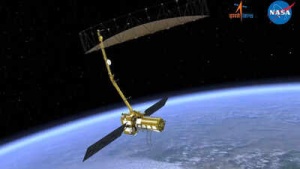Imagine a world where the Earth suddenly stopped spinning. While this may sound like science fiction, scientists have studied the consequences of such a scenario to understand the delicate balance of our planet. According to a study by the Institute for Environmental Research, although an instantaneous halt is virtually impossible, imagining it helps reveal how dependent life is on Earth's rotation.
The study explains that the sudden stop would unleash catastrophic forces. At the equator, everything not anchored, oceans, atmosphere, buildings, and even people, would continue moving at over 1,600 km/h, causing massive destruction. Beyond this immediate chaos, the redistribution of water toward the poles would reshape coastlines, extreme weather patterns would dominate, and ecosystems could collapse. Even the day-night cycle would be permanently altered, leaving one half of the planet in relentless daylight and the other in darkness.
Understanding these consequences not only highlights Earth’s fragility but also emphasises the importance of preserving its natural processes. Studying hypothetical scenarios allows researchers to predict environmental shifts and reinforces why rotation is crucial for life on our planet.
The consequences if Earth stopped spinning
Immediate catastrophic effects
If the Earth stopped spinning, the first and most visible consequences would occur due to inertia. The atmosphere and everything on the surface would continue moving eastward at the planet's rotational speed. Buildings would crumble, oceans would surge violently, and everything not firmly attached would be thrown in the direction of rotation. The equator would bear the brunt of this destruction, making initial survival almost impossible for many regions.
Redistribution of water and land
Earth’s rotation causes a bulge at the equator. If the spin stopped, gravity would pull water toward the poles, flooding polar regions and exposing new land near the equator. This dramatic redistribution would permanently alter coastlines, submerge cities, and create new deserts and oceans. The consequences for human settlements and ecosystems would be profound, requiring adaptation on an unprecedented scale.
Climate and weather disruptions
Without rotation, the day-night cycle would vanish. One side of the planet would experience continuous sunlight while the other plunged into permanent darkness. This would create extreme temperatures, from scorching heat to freezing cold, making large areas uninhabitable. Weather systems would collapse, storms would intensify, and winds would become unpredictable. Life forms adapted to current climates would struggle to survive.
Biological and ecological impact
Flora and fauna rely on Earth's rotation to regulate circadian rhythms and seasonal cycles. A stopped Earth would disrupt photosynthesis, migration patterns, and reproduction cycles. Many species would face extinction. Only resilient microorganisms or life in protected environments, such as deep oceans or underground, might persist. Humans would face unprecedented challenges in securing food, water, and shelter.
Geological consequences
The sudden halt would also trigger geological instability. The redistribution of mass could induce earthquakes and volcanic activity. Mountains might shift slightly, tectonic plates could become more active, and erosion patterns would change. Over decades, the planet’s surface would slowly settle into a new equilibrium, permanently reshaping the world.
Magnetic field and radiation exposure
Earth’s rotation drives its molten core, generating the magnetic field that shields the planet from solar radiation. Without rotation, this field would weaken or collapse, leaving the planet exposed to cosmic and solar radiation. This exposure would intensify the environmental hazards and further threaten life.
Long-term adaptation
Survivors of the initial chaos would need to adapt to a radically different planet. Agriculture, infrastructure, and energy systems would require complete redesigns. Coastal cities might be abandoned, and new human settlements would emerge in safer zones. The stopped rotation would redefine geography, climate, and human civilisation.
While the Earth stopping suddenly is virtually impossible, studying this scenario highlights the importance of rotation for life. From immediate destruction to long-term ecological, geological, and atmospheric consequences, the planet depends on its spin for stability.
Understanding this reminds us of the delicate forces sustaining life and reinforces why preserving natural planetary processes is essential. Science shows that even hypothetical extremes provide vital insights into Earth’s complex systems.
Also read|NASA unveils why the blood moon lights up the sky in red

 Duleep Trophy semifinals: Ruturaj Gaikwad scores crucial ton for West Zone, sends strong message to selectors
Duleep Trophy semifinals: Ruturaj Gaikwad scores crucial ton for West Zone, sends strong message to selectors
 'Ta Ra Rum Pum' Director's Tweet Fuels F1 Movie Comparisons, Ignites Fan Frenzy
'Ta Ra Rum Pum' Director's Tweet Fuels F1 Movie Comparisons, Ignites Fan Frenzy
 New York Assemblyman Zohran Mamdani's Style Guide: 5 Fashion Tips for the Modern Man
New York Assemblyman Zohran Mamdani's Style Guide: 5 Fashion Tips for the Modern Man
 Prasidh Krishna Targets Sharper Bowling Lengths, Lower Economy Rate After Test Performance Review
Prasidh Krishna Targets Sharper Bowling Lengths, Lower Economy Rate After Test Performance Review
 NASA-ISRO successfully deploy world’s largest radar antenna in orbit; a milestone in Earth observation
NASA-ISRO successfully deploy world’s largest radar antenna in orbit; a milestone in Earth observation
 Rishabh Pant's Fearless Batting Style Hailed by Greg Chappell as Game-Changing: Ex-India Coach Compares Him to Gilchrist After Twin Centuries vs. England
Rishabh Pant's Fearless Batting Style Hailed by Greg Chappell as Game-Changing: Ex-India Coach Compares Him to Gilchrist After Twin Centuries vs. England
 Samantha Ruth Prabhu's Throwback Thursday: Actress Shares Rare Teenage Photo
Samantha Ruth Prabhu's Throwback Thursday: Actress Shares Rare Teenage Photo
 Royal Challengers Bengaluru Dethrone Chennai Super Kings as IPL's Most Valuable Franchise
Royal Challengers Bengaluru Dethrone Chennai Super Kings as IPL's Most Valuable Franchise
 Blackcaps to Face Packed International Schedule: Australia, England, West Indies, and South Africa to Tour New Zealand
Blackcaps to Face Packed International Schedule: Australia, England, West Indies, and South Africa to Tour New Zealand
 Prithvi Shaw Admits to Losing Focus, Wrong Friends Led to Cricket Career Setback
Prithvi Shaw Admits to Losing Focus, Wrong Friends Led to Cricket Career Setback